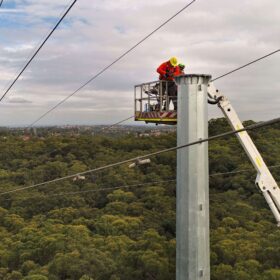The Proceedings of the National Academy of Sciences (USA) report ‘Trajectories of the Earth System in the Anthropocene’, investigates the risk of reaching and exceeding a climate tipping point, sparking a chain reaction of feedbacks in the climate system that could skyrocket global average temperature to well beyond a 2°C rise within a century or two and eventually lead to sea-level rises of from 10 to 60 metres higher than what is seen today.
“We are at risk of crossing a critical climate threshold,” said Climate Councillor and report lead author Professor Will Steffen, “Such a threshold could lie at a global temperature rise as low as 2°C above pre-industrial, within the Paris Climate Agreement targets”.
“Exceeding this climate tipping point could lead to the highest temperatures experienced in more than 1.2 million years, creating a ‘Hothouse Earth’ that humanity has never experienced before, hitting societies, economies and ecosystems around the world with devastating impacts,” he said.
Professor Steffen said the report shows that exceeding the critical climate tipping point could set off global ‘feedbacks’ (responses) in the form of weakening land and ocean carbon sinks, forest dieback and reductions in snow cover across the northern hemisphere, along with the loss of sea ice and polar ice sheets.
“Intensifying climate change, driven by the burning of fossil fuels such as coal, oil and gas, is pushing us closer to crossing a catastrophic climate threshold,” he said.
“Sitting on our hands means we are at risk of driving the Earth (and human well being) beyond an irreversible point of no return, with global average temperatures tipped to reach between 4-5°C higher than pre-industrial conditions.”
Professor Steffen said the report, created by an international team of experts in Earth System science, shows that unprecedented collective global action to slash rising greenhouse gas pollution levels is urgently needed to minimise the risk of crossing a climate point-of-no return that would lead to unprecedented extreme weather events and major climatic disruption around the world.
“It’s essential the world greatly accelerates the transition to clean, affordable and reliable renewable energy and battery storage, leaving the fossil fuels of the past far behind,” he said.
“Right now, global leaders still have the opportunity to work hard to achieve the Paris targets, but that window of opportunity is closing fast. Meeting our international commitments under the Paris Climate Agreement is more urgent than ever – technologies are developing rapidly; the only thing blocking this progress is political will ”
“We need to ask ourselves this: do we want to be remembered as the generation that had the opportunity to prevent catastrophic climate change, and didn’t?”
For more information please contact Climate Council Senior Communications Advisor Alexia Boland on 0438 972 260.






By submitting this form you agree to pv magazine using your data for the purposes of publishing your comment.
Your personal data will only be disclosed or otherwise transmitted to third parties for the purposes of spam filtering or if this is necessary for technical maintenance of the website. Any other transfer to third parties will not take place unless this is justified on the basis of applicable data protection regulations or if pv magazine is legally obliged to do so.
You may revoke this consent at any time with effect for the future, in which case your personal data will be deleted immediately. Otherwise, your data will be deleted if pv magazine has processed your request or the purpose of data storage is fulfilled.
Further information on data privacy can be found in our Data Protection Policy.